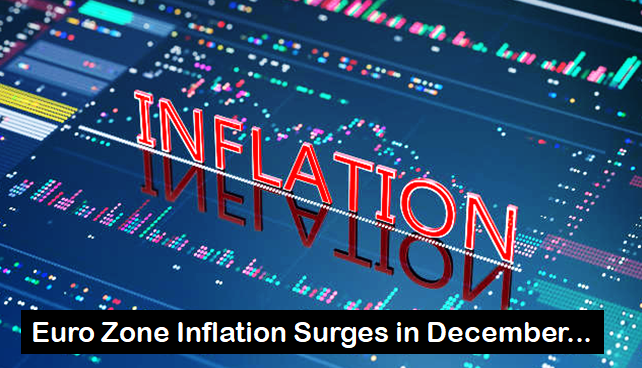Euro zone inflation experienced a notable increase in December, reaching 2.9% compared to 2.4% in November. Although just below the anticipated 3%, the rise was attributed to technical factors such as the conclusion of certain government subsidies and the exclusion of lower energy prices from the base figures. This uptick aligns with the European Central Bank’s (ECB) forecast that inflation bottomed out in November, projecting a range of 2.5% to 3% throughout 2024, exceeding the bank’s 2% target before a potential slowdown in 2025.
While headline inflation increased, underlying inflation, excluding food and energy, eased slightly to 3.4% from 3.6%. However, concerns arise as service inflation rose by 0.7% monthly, maintaining a steady 4% annual reading, potentially indicating a swift rise in incomes that could fuel further price pressures.
Market expectations suggest that the ECB may cut interest rates six times in 2024, beginning as early as March or April. Investors anticipate this move due to expectations of economic contraction and subdued wage growth, alleviating inflationary pressures. In contrast, ECB policymakers emphasize the persistence of inflationary pressures, asserting that crucial wage settlements are not finalized until the first quarter of the year. Some even argue that market rates have eased excessively, compelling the ECB to maintain higher rates for a more extended period to achieve economic restraint and curb inflation.
The divergence in views stems partly from the ECB’s historical inflation projection inaccuracies, prompting policymakers to prioritise factual data over projections. Investors, sceptical of the ECB’s optimism on economic growth, point to a significant drop in producer prices in November (-8.8%) as evidence of waning price pressures. Additionally, market expectations factor in aggressive rate cuts from the US Federal Reserve, speculating that the ECB will follow suit once the Fed initiates moves, potentially in March or May.
The ECB’s December projections foresee inflation at 2.6% in the final quarter of 2024, reaching 2% in Q3 2025, and eventually settling at 1.9%. The upcoming ECB meeting on January 25 is not anticipated to result in any policy action, as signaled by the bank. In Ireland, the annual inflation rate rose to 3.2% in December, up from 2.5% in November, according to a flash estimate from the Central Statistics Office.
Irish Samachar English News
Kindly click the link below to join WhatsApp group chat to get important news and breaking news from Irish Samachar.


Comments are closed.